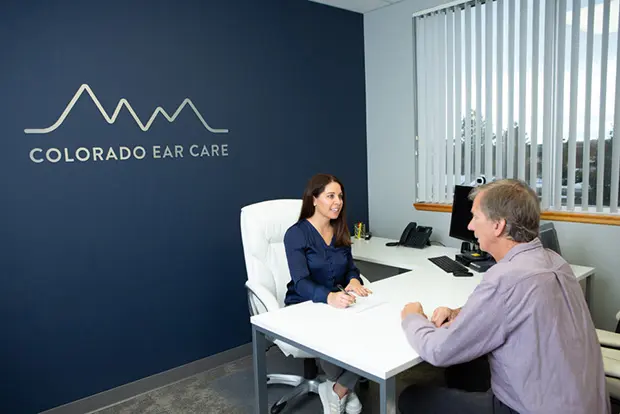Learn how expert audiology providers — like those at Colorado Ear Care — can assist you with your balance and dizziness issues.
Balance and dizziness-related issues are incredibly common. So common, in fact, that at least 90% of people report being affected by these conditions at some point in their lives.
Balance concerns increase as we age. According to the National Institute on Aging, 1 out of 3 adults over the age of 65 experience a fall each year.
Unfortunately, these falls don’t always get reported to their health providers — about half do not — and what’s worse is that experiencing a fall actually increases a person’s risk to fall again.
As we age, the repercussions of falls are progressively more severe. Not only do the associated medical costs amount to over $50 billion, but broken bones, hip fractures, head injuries, and traumatic brain injuries are an unfortunately common result of older adults falling.
Millions of people are sent to the emergency room and hundreds of thousands are hospitalized.
These experiences can quite justifiably create fears that a person will fall again. These fears will often limit a person’s activity, and that limitation of activity will also contribute to a potential risk of fall. A lack of muscle tone, a decrease in vitamin D, and certain prescription medications like painkillers will all create conditions that may contribute to a fall.
Combine those factors with home hazards like clutter, loose carpeting or rugs, and pets under foot, and your risk of falling and injuring yourself only increases.
What’s the most important thing you should do if you’re concerned about falling, for yourself or a loved one? See a professional.
Can an audiologist help with balance or dizziness issues?
Yes! The audiology professionals at Colorado Ear Care specialize in treating issues related to balance and dizziness.
Our training goes far beyond that of testing for hearing loss and precisely fitting hearing aids (though we specialize in those areas, as well).
We have training and experience in treating issues related to your outer, middle, and inner ear, and your body’s balance system in your inner ear. Sometimes, you’ll see the terms balance or vestibular system used interchangeably. Your body’s vestibular system transfers information related to movement, spatial relationships, and balance to your brain for processing.
Of course, this typically happens so quickly that you’re not really aware of it while it’s happening, but where there are issues, ones that create feelings of imbalance, dizziness, or make you feel less sure on your feet, there are few things more disorienting.
Many of the most common symptoms will include blurry vision, lightheadedness, nausea, dizziness and/or motion sickness, a lack of sure footedness, or feelings of spinning (vertigo).
Often, these symptoms will be triggered by certain head movements, which can in turn create a fear of making those movements, which can then limit a person’s mobility.
Maybe you’re experiencing occasional symptoms of imbalance. Maybe they’re becoming increasingly common. And maybe you’re feeling more than one at a time.
Whatever the case, we recommend you come see us so we can discuss those symptoms, conduct the appropriate tests, and assess your results in order to make the best treatment recommendations for you.
Colorado Ear Care provides comprehensive balance testing
We believe that the key to getting the right treatment is by offering the right testing and diagnostics, so we go above and beyond the average audiology practice experience. Some of our balance related tests include:
Rotary Chair Testing
Rotary chair testing is crucial in helping to identify the source of your balance problems, because the test involves recording your eye movements via infrared video goggles that are worn while the chair is slowly rotated.
This is the same testing equipment used in prestigious facilities such as Johns Hopkins University. We’re the only audiology clinic in Colorado who can provide you this test for balance and dizziness concerns.
Videonystagmography (VNG)
This is perhaps the most common balance test offered to patients. It also records eye movement, and helps your provider identify any vulnerabilities in your vestibular or central nervous systems, or if there is vertigo detected when your head is placed in certain positions.
Vestibular-Evoked Myogenic Potentials (VEMPs)
A VEMP is a quick and non-invasive test that essentially measures muscular responsiveness to sounds, giving your provider insight about the health of your saccule sensory organ and its ability to properly orient your body in spatial situations.
Gans Sensory Organization Performance Test (SOP)
The SOP test helps us understand more information about your equilibrium. Are you overly reliant on your vision or surfaces to maintain your balance? The SOP test will let us know, quickly, and simply.
Visual Acuity Test
Sometimes, your vision can become blurry with certain head movements, causing feelings of imbalance. The VAT tests this experience by observing potential changes in vision when the head is in different positions.
Audiologic Testing
Balance issues can, at times, be associated with hearing loss. We’ll use our core testing methods as well as tests that go beyond core testing methods, like Otoacoustic Emissions and Brainstem Auditory Evoked Responses (BAER) so that we can have a deeper understanding of the type of hearing loss, and its source.
Concerned about your balance? Do you have a loved one experiencing balance and dizziness issues? Contact Colorado Ear Care today. You deserve comprehensive testing, treatment, and care, and that’s exactly what we provide. Don’t delay.

